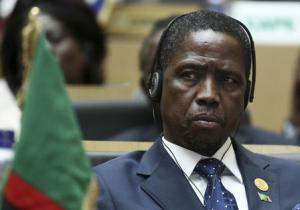It was my twitter feed that first alerted me last weekend to the news that Zambia's President had forced the central bank head in that country out of office and vowed lower interest rates.
Good for twitter! this is proof of its value -- the value of net based social media generally -- in tailoring news.

In old-fashioned dead-tree newspapers, whence most of my news used to come (until very recently) the goings-on in Zambia would have been tucked into a small item very deep in the paper, if it was deemed fir to print at all by the papers in the "developed" world.
But in fact, I deem it an important, perhaps the biggest one coming at us that day, and I'm glad to have received it when I did.
One of the significant facts about the story is that it dramatically demonstrates that central banks are only independent of the executive offices of a country when they are allowed to be independent by those executive offices. In other words, they aren't really all that independent. This in fact was the gist of the first tweet I encountered on the subject. Allen Mattich tweeted, "Does anyone every [sic] have any illusions about central bank independence in Zambia?" That inspired me to look at the item he was re-tweeting and commenting upon, and eventually to go to an actual news site (Bloomberg's as it happens) to look this up.
Something else that makes this significant is the guy who has stepped in as the new chief central banker in Zambia. The fellow whose photo you see above. Here is the URL to that Bloomberg story.
Denny Kalyalya takes over. He is a former governor of the World Bank. Just in case I have among my readers any developed-world chauvanists who think Zambia is an irrelevant backwater. In the 21st century economy there are no backwaters. Everybody is interconnected, and the new head of the central bank in Zambia is a graduate of the University of Massachusetts who has sat on the board of directors of the World Bank.
So he is not just a central banker of one developing country, made so by the president's fiat. He is a member of the elite crowd of the globe's central bankers.
So who is controlling whom? Does this development show that the president is in control of his nation's central bank, or that the elite crowd of central bankers is firmly in control of the world's various presidents? It is a little as if Zambia is the spot where a curtain has lifted.
Will we hear a booming voice soon saying, "pay no attention to those machinations behind the curtain"?
Good for twitter! this is proof of its value -- the value of net based social media generally -- in tailoring news.

In old-fashioned dead-tree newspapers, whence most of my news used to come (until very recently) the goings-on in Zambia would have been tucked into a small item very deep in the paper, if it was deemed fir to print at all by the papers in the "developed" world.
But in fact, I deem it an important, perhaps the biggest one coming at us that day, and I'm glad to have received it when I did.
One of the significant facts about the story is that it dramatically demonstrates that central banks are only independent of the executive offices of a country when they are allowed to be independent by those executive offices. In other words, they aren't really all that independent. This in fact was the gist of the first tweet I encountered on the subject. Allen Mattich tweeted, "Does anyone every [sic] have any illusions about central bank independence in Zambia?" That inspired me to look at the item he was re-tweeting and commenting upon, and eventually to go to an actual news site (Bloomberg's as it happens) to look this up.
Something else that makes this significant is the guy who has stepped in as the new chief central banker in Zambia. The fellow whose photo you see above. Here is the URL to that Bloomberg story.
Denny Kalyalya takes over. He is a former governor of the World Bank. Just in case I have among my readers any developed-world chauvanists who think Zambia is an irrelevant backwater. In the 21st century economy there are no backwaters. Everybody is interconnected, and the new head of the central bank in Zambia is a graduate of the University of Massachusetts who has sat on the board of directors of the World Bank.
So he is not just a central banker of one developing country, made so by the president's fiat. He is a member of the elite crowd of the globe's central bankers.
So who is controlling whom? Does this development show that the president is in control of his nation's central bank, or that the elite crowd of central bankers is firmly in control of the world's various presidents? It is a little as if Zambia is the spot where a curtain has lifted.
Will we hear a booming voice soon saying, "pay no attention to those machinations behind the curtain"?
Comments
Post a Comment